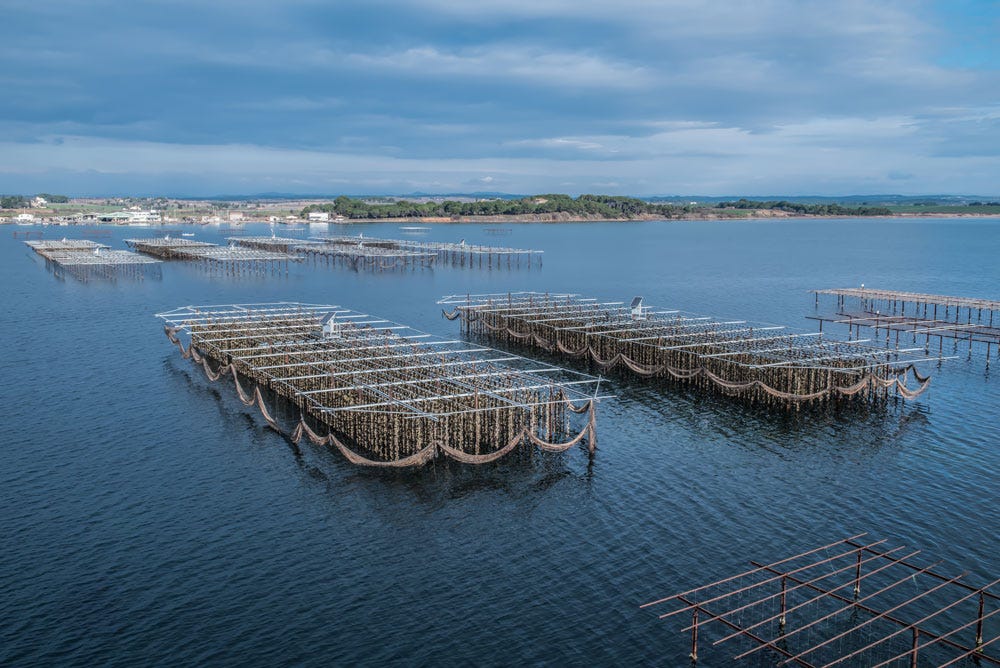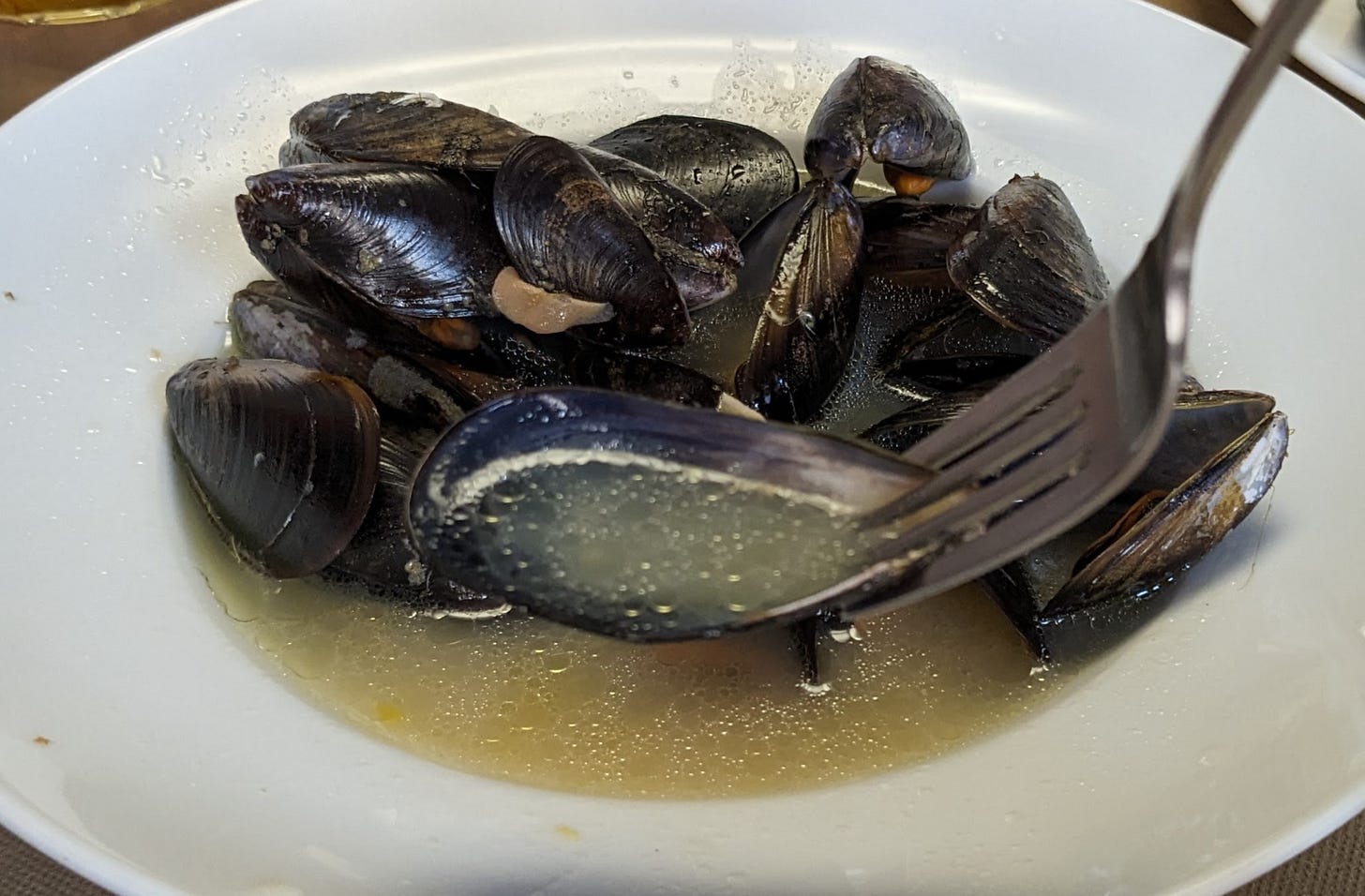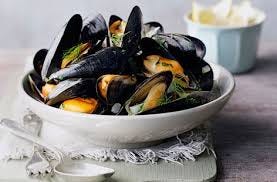
Not everyone is going to want to read about mussels. I commiserate. They can repel. They can make some people very ill. A bad one nearly killed my mother on holiday in Brittany. It didn’t stop her eating them at the very next opportunity, but that was not a good move on her part: once you’ve been affected by any bad mollusc, you basically have to renounce them forever. Even perfectly fresh, one consumed after a previous untoward event can overwhelm the digestive system. The body doesn't shut down so much as fully open up.
Still, they do deserve a hearing. These bivalves, in a class that, astonishingly, includes 30,000 species from the familiar scallops and oysters to double shells I hadn’t heard of, are, in my (unscientifically tutored) opinion, what we need to dump en masse into our British waterways.
Mussels could solve the horrendous contamination that is a result of foreign companies being allowed to buy up Britain's water supply and using the profits to pay massive bonuses to their directors and shareholders - £1.4bn in dividends in 2022, up £540m from the previous year - rather than invest in providing consumers with water pure enough to drink and to swim in. In one year, enough raw sewage was released from 30 water treatment plants to fill 4,352 Olympic swimming pools.
The state of British water is a good reflection of now-standard corporate British morality received with a what-can-you-do shrug. We are not alone. Look at this summer’s problems in Paris faced by the Olympic organisers over the quality of the River Seine, unsafe to host swimming events on the scheduled day.
Our waters may not be clean but, contrary to popular suspicion, mussels are. Like other molluscs, both the seawater and the freshwater variety are the shellfish version of kidneys, removing waste material from water. Oysters filter up to five litres of water an hour. Historically, the flourishing oyster population of the 4,479 square mile Chesapeake Bay on the US Eastern Seaboard could filter the entire water volume of that enormous estuary every three or four days. Now it’s so polluted the process takes nearly one year.
Generally what mussels feed on is not what you imagine. It is a myth that they hoover up excrement - although as they scavenge the floor of the sea or river, it may be that some is incorporated in the bottom-feeding they are nicknamed for, but not enough to signify. It’s plankton and other microscopic sea creatures that predominantly they consume.
My view of the mussel as a potential vacuum cleaner is shared by scientists. A team led by Penelope Lindeque, an ecologist at the UK’s Plymouth Marine Laboratory, has discovered that the blue mussel (Mytilus edulis) will also eat microplastics and other pollutants without causing harm to itself. One 5kg/11lbs cluster of 300 mussels was found to filter out over 250,000 microplastics an hour. These microplastics are then expelled by the mussels and rapidly sink, making it easier to remove them from the water - even with the high buoyancy level of the particles.
Eight to twelve million tonnes of plastic end up in the ocean annually - the equivalent of a full truckload dumped into the sea every single minute. Still, the usefulness of mussels as clean-up machines doesn’t improve their reputation in Britain and the US as the poor man’s shellfish, along with whelks, winkles and cockles (clams are no longer on the list) - all molluscs highly-prized by sensible southern Europeans.
In Europe, it’s the Spanish who lead the way in mussel cultivation, although the Chinese, wouldn’t you know, account for 40 percent of global production. In North America, where mussel culture began only in the late 1970s, 80 percent come from Prince Edward Island in Canada.
The Spanish and Portuguese conjure remarkable stews from mussels. The Greeks and Turks fry them with herbs. But it’s the French who truly celebrate them, with mussel farms out to sea where they grow on bouchots, thick ropes, along the Normandy and Brittany coast, as well as down south in Bouzigues and Sète.
We’re all familiar with Moules Marinière and possibly Moules à la Bordelaise with its tomato puree-flavoured sauce. But there are many versions of ‘mouclade’, a mussel stew said to originate in the Saintonge region of the Charente-Maritime on the west coast of France, where ‘moucle’ is the Saintonge word for mussel. There they add to the broth egg yolks, Pineau des Charentes (a fortified sweet white wine), garlic and cream. In the Charente-Maritime’s Fouras region, curry is the flavour.
The point of any mussel stew is that mussels make an elegant, sophisticated dish from a very cheap main ingredient. For me, the best part is the broth. But you’re not always offered a spoon to slurp it up. That’s because there’s A Method that sorts the aficionado from the novice. It’s best illustrated by this photograph I took last year in Andalucia:
Basically, you thread the pointy end of a single mussel shell onto the tines of your fork and use that as your spoon. You already know, of course, that you are not seen as a mussel connoisseur if you use your fork to prang out the mussel meat. You should use an empty hinged mussel whose meat you’ve already picked out and eaten as the pincers with which to pinch out every next one.
This recipe is the most well known and simplest of mussel stews which you can use as a base for other variations, adding Pernod or cream or curry or orange zest or more. Just be sure you clean your mussels well before you begin: you don’t want sand at the bottom of your soup bowl grating against your teeth. Give each mussel a firm scrub under a running tap, pull away the ‘beard’, and toss any with a broken or cracked shell or which remain open after you’ve given the shell a sharp tap with a knife handle. Drop them into a big bowl of water for 10 minutes then drain and cook - the same day you’ve bought them.
Serves 6
2 large yellow onions, chopped
3 shallots, chopped
2 cloves garlic, chopped
1 bay leaf
1 tablespoon flat-leaf parsley, chopped plus more for finishing
285ml/½ pint dry white wine
2¾kg/6lb mussels
55g/2 oz butter
120ml/4fl oz double cream (optional)
Salt and freshly ground pepper to taste
Put the first six ingredients into a large lidded pan and simmer 5-6 minutes. Add the mussels. Stick the lid on and over medium heat leave them to steam open. Drain them through a colander into a bowl and slide them into a warmed tureen. Pour the liquor into a saucepan and warm up again over a medium-low heat. Whisk in the butter, and cream if using, season to taste, and pour over the mussels. Sprinkle with the extra parsley and eat at once with plenty of crusty baguette and an empty central bowl for the discarded shells.






I'm lucky. I live near what styles itself as the 'best Belgian gastropub in London' (against what I imagine is fairly limited competition). Anyhow, it always has a choice of mussels - mariniere, with cream, Spanish, Thai curry etc - and very good chips. Also Belgian beer. If anyone lives in south west London, I can recommend Brouge as the place to go for a mussel fest.
To prang, an excellent verb. As a mussel fancier I confess with some embarrassment that I have not been using an empty shell as my pincer, nor have I employed the fork-cum-shell method. I am in the primitive school of eaters, doing as much as possible without utensils of any kind. A single mussel shell does nicely to scoop up the broth. My introduction to mussels was in the north of Scotland, where they grew in great masses on the rocks in front of the Croft I rented. I could gather a bushel in two minutes. But then I had to drive an hour to buy garlic in Ullapool.
When are you coming to the US?